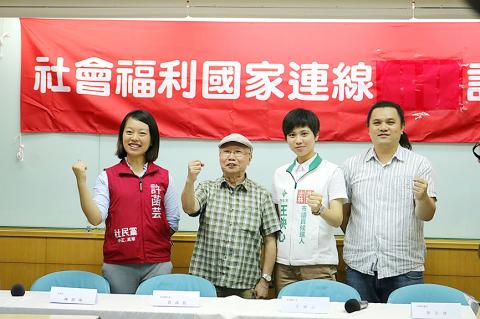The Social Welfare State Front, a coalition of the Social Democratic Party (SDP), Taiwan Radical Wings and the Green Party Taiwan, yesterday said it aims to win at least three councilor seats each in Taipei, Taoyuan, Hsinchu, Tainan and Kaohsiung in the Nov. 24 elections, and to establish united party caucuses in the cities.
The three parties on June 19 founded the front with mediation from former Democratic Progressive Party legislator Chen Zau-nan (陳昭南) to promote their shared platform policies, which include improving public housing, childcare and transportation, and establishing subsidies for start-ups.
The front has candidates in 24 constituencies, Chen said, adding that while the final candidate lists for 20 constituencies have already been determined, those for the remaining four are still being discussed.

Photo courtesy of the Social Welfare State Front
The front is to field one candidate in every constituency, he said.
“If there is more than one candidate, and if no consensus can be reached on who should run in the area, then a primary election would be held in the constituency for local residents to vote for their preferred candidate, but there is also the option of having multiple candidates in one constituency,” Chen said.
The SDP has candidates in five constituencies in Taipei and hopes to have at least three elected in November, said SDP member Hsu Han-yun (許菡芸), who is running for a seat on the Taipei City Council.
The front’s platform would benefit not only Taipei, but also other cities and counties, said Ong Iong-sim (王映心) of the Taiwan Radical Wings, who is also competing for a seat in the Taipei City Council.
“In addition to improving the economy, we should also ensure that wealth is justly distributed. For example, did our salaries increase when GDP growth increased? Instead of being paid more, many were paid less as the wealth gap continues to widen,” Ong said.
The Green Party has councilor candidates in Taoyuan, Jhongli and Hsinchu, and is to nominate more in Hsinchu, party secretary-general Chang Chih-wei (張志偉) said.
The party in 2015 formed the Green-SDP Alliance and hopes to do so again to defeat the New Power Party (NPP), Chang said.
“The NPP has refused to communicate, discuss or negotiate with us. Considering how tough the environment is for minor parties, the NPP, as the most influential minor party, should be more responsible, but if they are unwilling, the Green Party will take up that role,” he said.
The SDP is still considering whether to form an alliance with the Green Party, Hsu said, adding that it also hopes that the NPP would discuss the possibility of collaborating with other minor parties.
The front welcomes any young people who support their platform to join, with the exception of those in the Chinese Nationalist Party (KMT), New Party, People First Party and Chinese Unity Promotion Party, Chen said, adding that he hopes to see more young people with vision replace incompetent politicians from major parties.

SHIPS, TRAINS AND AUTOMOBILES: The ministry has announced changes to varied transportation industries taking effect soon, with a number of effects for passengers Beginning next month, the post office is canceling signature upon delivery and written inquiry services for international registered small packets in accordance with the new policy of the Universal Postal Union, the Ministry of Transportation and Communications said yesterday. The new policy does not apply to packets that are to be delivered to China, the ministry said. Senders of international registered small packets would receive a NT$10 rebate on postage if the packets are sent from Jan. 1 to March 31, it added. The ministry said that three other policies are also scheduled to take effect next month. International cruise ship operators

HORROR STORIES: One victim recounted not realizing they had been stabbed and seeing people bleeding, while another recalled breaking down in tears after fleeing A man on Friday died after he tried to fight the knife-wielding suspect who went on a stabbing spree near two of Taipei’s busiest metro stations, Taipei Mayor Chiang Wan-an (蔣萬安) said. The 57-year-old man, identified by his family name, Yu (余), encountered the suspect at Exit M7 of Taipei Main Station and immediately tried to stop him, but was fatally wounded and later died, Chiang said, calling the incident “heartbreaking.” Yu’s family would receive at least NT$5 million (US$158,584) in compensation through the Taipei Rapid Transit Corp’s (TRTC) insurance coverage, he said after convening an emergency security response meeting yesterday morning. National

PLANNED: The suspect visited the crime scene before the killings, seeking information on how to access the roof, and had extensively researched a 2014 stabbing incident The suspect in a stabbing attack that killed three people and injured 11 in Taipei on Friday had planned the assault and set fires at other locations earlier in the day, law enforcement officials said yesterday. National Police Agency (NPA) Director-General Chang Jung-hsin (張榮興) said the suspect, a 27-year-old man named Chang Wen (張文), began the attacks at 3:40pm, first setting off smoke bombs on a road, damaging cars and motorbikes. Earlier, Chang Wen set fire to a rental room where he was staying on Gongyuan Road in Zhongzheng District (中正), Chang Jung-hsin said. The suspect later threw smoke grenades near two exits

The Forestry and Nature Conservation Agency yesterday launched a gift box to market honey “certified by a Formosan black bear” in appreciation of a beekeeper’s amicable interaction with a honey-thieving bear. Beekeeper Chih Ming-chen (池明鎮) in January inspected his bee farm in Hualien County’s Jhuosi Township (卓溪) and found that more than 20 beehives had been destroyed and many hives were eaten, with bear droppings and paw prints near the destroyed hives, the agency said. Chih returned to the farm to move the remaining beehives away that evening when he encountered a Formosan black bear only 20m away, the agency said. The bear